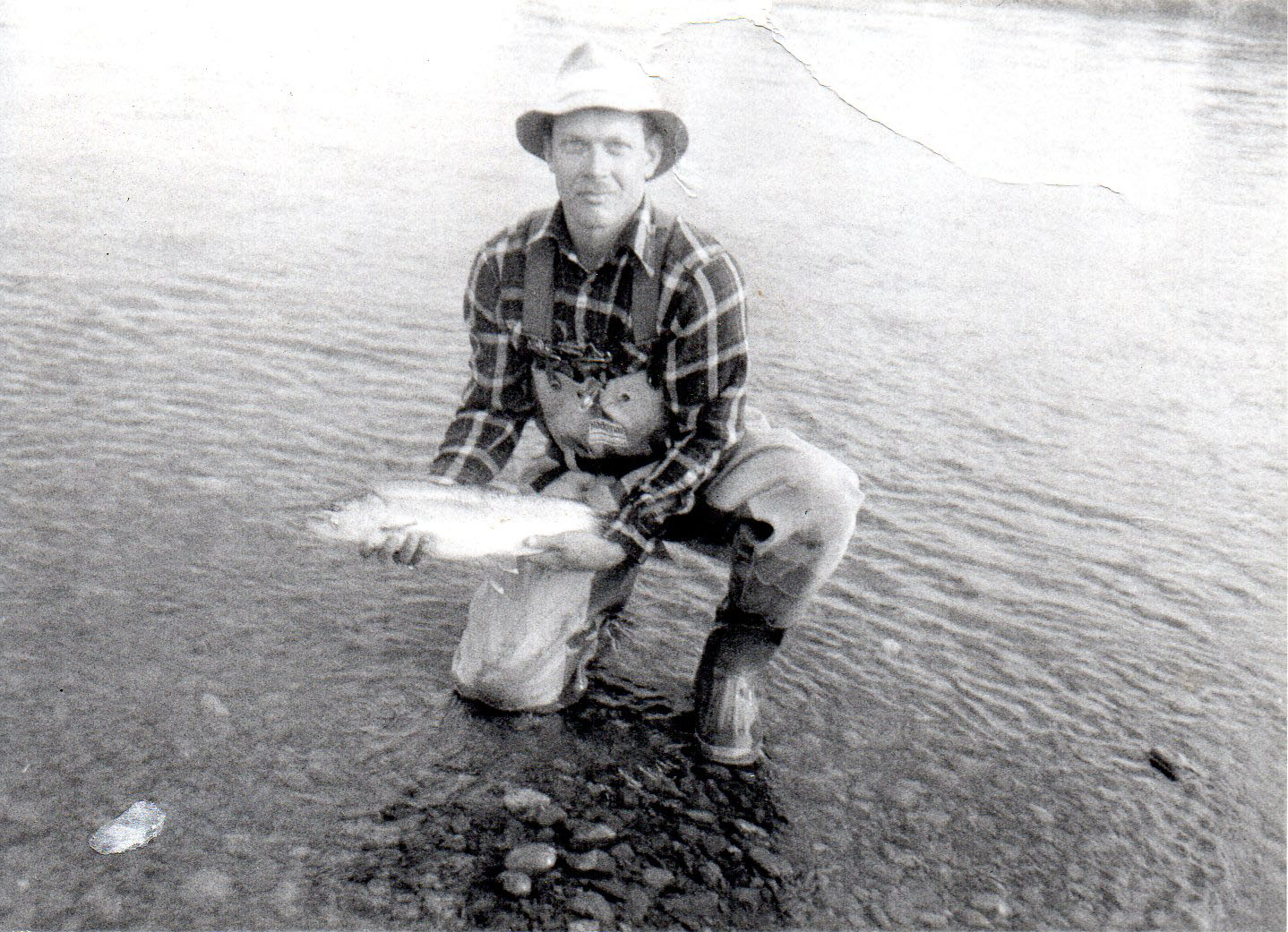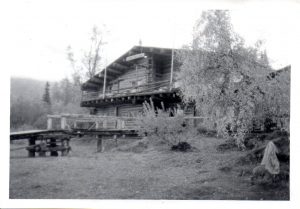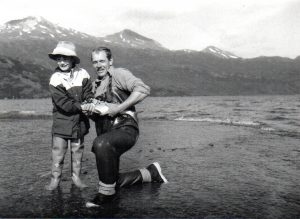
“Learning is not compulsory… neither is survival”
~ W. Edwards Deming
A fishing guide’s day is best described as one big improvisation. Nothing about it is certain and even less is predictable. The measure of a guide’s competency is often determined by how well he improvises… and that depends on how prepared he is.
There are two very different ways to be prepared. One manner is to lug around four hundred and forty seven pounds of gear, a thingamajig for every situation. This is usually the first stage in a guide’s development; compensating for lack of experience with lots of extra equipment. During the early years in Alaska, my fishing vest weighed 30 pounds, and photographs from that period show me as a kind of malformed hunchback!
If one is inexperienced, it’s a safe way to go. My fishermen always had what they needed, even if I had trouble finding it. After taking my vest off to get into one of the back pockets, my fishermen often helped me get it back on, like a couple of knaves assisting their knight don his armor for the next joust.
It’s best to be prepared with experience, training, and maturity, and to some degree I believe in the old axiom, the more you know, the less you need. Still, there’s a fine balance between experience and gear; an equilibrium that I hadn’t quite mastered that first spring in Alaska when the Boss asked me if I’d like to take a little trip.
“We need a boat at the bottom of the Togiak to fish for king salmon,” he said, sipping his morning coffee. “How would you like to take a little jaunt?”
Out of the corner of my eye I saw Rusty leading a detail of new guys with shovels and five-gallon buckets to repair a leaking septic system. “When do we leave?” I asked.
“Half an hour,” he said. “Get with Rusty and find out what you’ll need, plan to spend the night.”
Rusty had rolled a cigarette while waiting for me in the doorway of the bunkhouse, under a sign that read, THE SWAMP. He was the consummate Alaskan guide; an accomplished woodsman by nature, a jack-of-all-trades by necessity… and a good part pack rat. His advice would’ve been invaluable, if I’d had the sense to listen.
“So, you’re going on your first big sea cruise,” Rusty cackled. “Too bad you’ll miss out on all of the fun over at the big brown hole in the ground. How much time did the Boss give you?
“Half an hour.”
“Be there in twenty.”
“Right. I’m running a boat from Togiak Lake….”
“I know what you’re doing, weasel. I’m here because I’d rather help you than slop last season’s poop! Now remember what I told you about getting the motor on right, and be sure to use an ‘idiot rope’ in case you hit a rock or it vibrates off.”
“Right.”
“The Boss and I will make sure that you have enough mixed gas for the trip. Get your personal gear together. Grab a tent and whatever else you need from the warehouse, and food from the pantry.”
“Right.”
“I’ll be down on the dock to help you load up the motor and all of your gear.”
“Thanks.”
 I was excited about the trip and a bit nervous about making the Boss wait so I rushed gathering my gear. When I got to the warehouse I figured that for one night, I could make do with a tarp and some rope; I’d fashion my own shelter. No sense in messing with a camp stove, or even a grill for that matter. I’d just grab a couple of cans of peaches from the pantry and not have to mess with any cooking or cleaning. That way, I reasoned, I’d have a little more time to fish.
I was excited about the trip and a bit nervous about making the Boss wait so I rushed gathering my gear. When I got to the warehouse I figured that for one night, I could make do with a tarp and some rope; I’d fashion my own shelter. No sense in messing with a camp stove, or even a grill for that matter. I’d just grab a couple of cans of peaches from the pantry and not have to mess with any cooking or cleaning. That way, I reasoned, I’d have a little more time to fish.
When I got to the dock, the Beaver was idling while the Boss and Rusty loaded the outboard motor into the plane. After they belted it to the floor, Rusty called for me to hand him my gear. I tossed him my sleeping bag, the tarp, my backpack, and a rod tube.
“Is that it? That’s all you’re taking?” Rusty asked in disbelief.
“ I guess the boy likes to travel light,” The Boss said arching an eyebrow.
“Jeezus,” Rusty said shaking his head and mumbling something that was lost in the engine noise as he walked off the dock.
When he returned, he was carrying a large ammo can. He tossed it into the back of the plane, climbed through, and wormed his way into the right seat.
“Cut us loose and jump in,” the Boss yelled. “You sit on the motor.”
The day was bright and clear, so we spiraled up and out of the narrow Mikchak Lake Valley and climbed to an altitude that would allow for a direct route over the mountains. It was a breathtaking flight.
We picked up the Togiak River where it left Togiak Lake, and followed it for a short while. “Jondik Creek,” Rusty yelled over the engine noise and pointed, “good char spot.”
“Where’d you leave it?” The Boss yelled to Rusty.
“Two more bends down river… there!” He said, pointing at some trees where he’d stashed the boat.
The boat was tied up in the trees, a good fifty yards from the river. Instead of landing there, as I thought we would, however, the Boss dropped altitude and followed the river. I was to get a tour.
“Watch out for those!” The Boss said, dipping a wing to show me a deceptively calm stretch of water with enormous rocks hidden just below the surface. “That’s the Kemuk River. Kashaiak is just a bit further down on the same side. You’ll spend the night there. Get up early the next day and run down to the big bluffs, past the Gechiak River and below the Pongo. I’ll fly you over it so you know what it looks like.”
We circled a high earthen bluff on the west side of the main river, not that far from the costal village of Togiak. “Pull the boat into the downstream slough. I’ll need the upstream one to park the plane.”
With the tour completed, we headed directly back to the boat, often times losing sight of the river. After landing, we hauled the boat and two porcupine gnawed oars down to the water and attached the motor (with the idiot rope). As it warmed, I loaded my gear and a small hatchet that I’d found, stuck fast in the tree where the boat had been tied. Before climbing into the plane, Rusty asked. “You bring a tool kit?”
“Naw… I forgot it.”
“That’s what I thought. Take this,” he said, handing me the ammo can. “ You’ll find a little bit of everything there. Don’t lose it.”
“Thanks.” I said, as he turned back to the plane, pushed it out into the current, jumped on a float and yelled, “Clear!”
As the Beaver disappeared into the blue haze of the distant mountains, I suddenly felt very alone and realized that screwing up would be a very bad thing. I decided to assuage my concerns by having an early lunch; I ate one of my cans of peaches.
There’s something hypnotic about traveling down a river that doesn’t have another soul on it. Had I been watching a compass, my serpentine route would have taken me to every point. The effect was completely disorienting and somniferous. I smiled benignly at the huge, barely-submerged rock that passed just off of the bow.
“Holy shit!” I yelled with the realization that if I’d been just a few feet to either side, I’d of smashed the boat. I killed the motor, raised it, and jumped on the oars to control my drift.
Crack! Both of the porcupine-gnawed oars broke, leaving me with two short, impotent stubs. I would have laughed if I weren’t so terrified. This must be the section of river that the Boss had warned me about, I thought. Why didn’t I think to bring a new set of oars? If my recollection was accurate, I’d have to drift another few hundred yards to be in the clear. When I reached the Kemuk River, I sighed with relief, started the motor and was off again… more alert now.
The late northern dusk was upon me as I neared Kashaiak Mountain and looked for the mouth of the tributary. What seemed obvious from above looked very different on the water. When the river mouth was finally located, I started about the business of building camp; I cleared a spot on the beach and took the ax into the woods to find some poles over which to stretch my tarp. I was cutting the last limb when I realized that if I hadn’t found the hatchet in the tree over the cached boat, I would have had to hack through the limbs with my Swiss knife. I resolved to keep it, and carry it in my kit.
With my shelter made, and sleeping bag laid out, I decided it was time to fish. The flat below the river mouth was alive with Dolly Varden. These were the first Dollies I’d seen and I was amazed at how firm fleshed they were as I held them in the current to revive. My mouth watered. If only I’d brought a frying pan. I thought. Oh well… next time. I ate only half of my remaining peaches to save something for breakfast.
A fire was completely unnecessary, as it was a warm night and I had a good sleeping bag, but it suddenly seemed less of a luxury than a way to deal with my newfound apprehension about the bear crashing around in the woods behind me. There was plenty of driftwood on the beach and I nervously set off to collect enough to light the entire gravel bar. There was plenty of wood about, but none of it too dry, as it had spent the past several months under water.
Some dead tree branches would do for kindling, but even so, I’d need some gas. Boat gas eventually did the trick, but for the most part it just burned off and left soot covered and smoking wood. Next time I’d bring some diesel fuel from the lodge.
I fell asleep wishing the hatchet at my side was a shotgun loaded with buck shot, and started with the realization that I’d left a half of a can of peaches in sugary syrup just a few feet away. I finished off my breakfast and thoroughly washed out the can before putting it into the boat. Even though it was high and dry, I tossed out the anchor as an after-thought.
The dawn came cold, grey, and wet. The river had risen over a foot! The fire was completely washed away and the boat hung tethered in the current to the anchor I almost didn’t use. Even though my sleeping bag was just a few inches from being soaked, I decided to get the boat first. The water was almost over my hip boots before I could snag it, and tie it to a tree that had been seventy feet from any water the night before.
Camp was quickly broken as the river continued to rise. It was in the trees when I started downriver to find the bluff where The Boss would land with our fishermen. I thought dreamily of a hot cup of coffee and a cookie or two for breakfast.
The river was up and running fast, and I found the bluff earlier than expected, though it was difficult to tell the main river from its swollen braids. I pulled the boat into the lower slough and walked the length of the bluff to await the plane. As I waited the wind died, the rain ceased, and the ceiling dropped down into the trees.
It soon became apparent that no plane would come, and that I’d better start thinking about a place to spend the night. I decided the bluff was the only place to camp, as everything else was in danger of being swamped. I crossed the engorged river to a thicket of flooded alders, and tried to find some poles to cut for a shelter.
An hour later, I sat in my improvised tent, hungry and cold, eyes to the northeast, waiting for nightfall… and slapped the first mosquito. Suddenly, I was engulfed in them. In a mounting panic I scrounged through my gear for bug dope. There’d been no bugs to speak of back at the lodge, and I’d brought none. What could I have been thinking?
Overwhelmed with terror, and now trailing a hoard of mosquitoes, I ran to the boat and motored out into the river. It was better out on the water, but I could hardly spend the night anchored in the flow, as whole trees were beginning to float past.
It was then that I remembered Rusty’s ammo can. I opened it slowly, and though it was almost too much to hope for, I prayed that there might be a bottle of bug dope. I felt as if I’d won the lottery! Besides all of the tools necessary to carry out a minor engine rebuild, there were waterproof matches, bug dope, and a heavy duty zip lock bag that contained smaller bags of beef jerky, peanuts, dried apricots, and a chocolate bar. There was also a can of fruit cocktail, cigarette papers, a small tin of tobacco, and a flask of Jack Daniel’s.
I rationed the food but wasn’t nearly as frugal with the whiskey, and I slept more fitfully that second night. I awoke before dawn to the sharp barks of a short-eared owl. Stars danced high overhead, and the river seemed to be falling. I fell back asleep comforted by the belief that a plane would arrive in the morning.
 Perhaps it was the whiskey, but more likely it was the feeling of wellbeing that caused me to oversleep. The buzzing in my ear started out to be just another pesky mosquito, but suddenly became the roar of a de Havilland Beaver. The Boss circled a few times to let me get the sleep out of my eyes and my hip boots on, and I was waiting in the slough as the plane taxied to a stop. Rusty hopped off the float with a grin, “Well looky what the cat dragged out of the trash!”
Perhaps it was the whiskey, but more likely it was the feeling of wellbeing that caused me to oversleep. The buzzing in my ear started out to be just another pesky mosquito, but suddenly became the roar of a de Havilland Beaver. The Boss circled a few times to let me get the sleep out of my eyes and my hip boots on, and I was waiting in the slough as the plane taxied to a stop. Rusty hopped off the float with a grin, “Well looky what the cat dragged out of the trash!”
I grinned back.
“Here, take these oars. We’ll need them, right?”
Back at the lodge that night, we stood together at the bar. I was determined to see just how much whiskey I could buy Rusty before he’d call it quits. Eventually, I realized that it was not a good idea to keep going. “This last ones on me.” Rusty said to the bartender. “So, what’d you learn, weasel?”
“Plenty,” I answered. “ Thanks for the whiskey, and all the help.”
“You know, all that really matters is getting the job done. You don’t earn extra points for suffering.” Then, he added. “By the way, can I have my hatchet back?”
It was only then that I remembered how sharp and rust free it had been when I found it.
–
Postscript
In the years that followed, I learned a lot from Rusty and gained the experience necessary to develop a list of essential gear. It varied from day to day of course, and changed over the season, but here’s what was usually in my backpack.
- A Gore-Tex, rain jacket compressed into a stuff sack
- A stuff sack that contained a fleece watch cap, fleece mittens, elbow length Gore-Tex mitten shells, a pair of wool socks, and fingerless fleece fishing gloves
- A quart bottle of water (now I’d carry a quart filter pump)
- A quart bottle of diesel fuel
- A basic first aid kit… with some extras
- Bug dope
- Sun block
- A sheathed knife and diamond lap
- Two nesting knife/fork/spoon sets and three Sierra cups
- Leather welder’s gloves (for cooking – in a heavy-duty zip lock bag)
- My spatula
- Waterproof matches (in a match safe) and a tube of fire paste (in a heavy-duty zip lock bag)
- A compass
- An aircraft radio (in a heavy duty zip lock bag)
- My spice kit (unbreakable screw cap jars in a stuff sack)
- A sheathed, Estwing camp ax (with a loop of nylon cord as a lanyard)
- A small stuff sack with 100’ of small diameter nylon cord, a whistle, three heavy-duty trash bags and three Power Bars
- My camera (and film, filters, and a spare battery)
- My fleece pullover, if I wasn’t wearing it.
On my person I’d always carry…
- A locking blade Swiss knife on a lanyard of nylon cord
- A match safe with “strike anywhere” matches
- A storm proof lighter
- Polarized glasses on a lanyard
- A bandanna
- A waterproof watch
- A hat
Even while we’d guffaw at some of the new contrivances that showed up on the river, every guide appreciates an equipped and well-prepared angler. The fisherman who produces the only dry match (or a storm proof lighter) on a cold and rainy day is a cherished friend.





